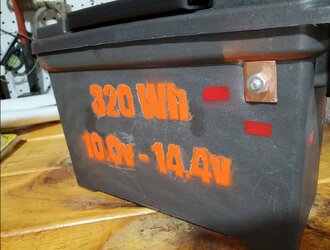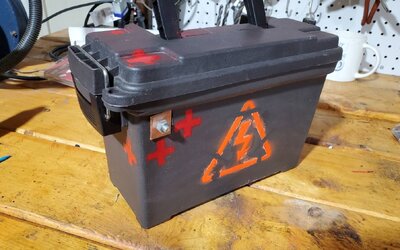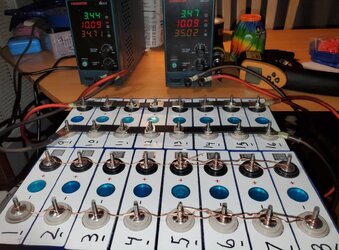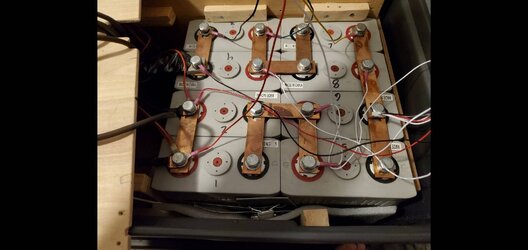Smells Like Sulfur
Well-Known Member
I have a bunch of batteries that I would like to sell either individually, or in an assembled and functioning pack. They are mostly all LiFePO4 (the one that tends to not explode as much). I also have a big box of recycled 18650s as well, they all test within 85% of their original capacity, some more.
I have 16 CALB 100ah cells that can put out 20c for a few seconds, and 48 smaller (but much higher powered) "TopBand" 25ah cells that are from a recycled military project and test perfectly. I've used a 4s pack of the smaller ones to jumpstart my 4Runner when it was around 0°. A single one of those cells will push out well over 300 amps @ 3.2v.
I also have a handful of battery management systems in 12 and 24 volt configurations from 40amps to 300a, but I'm willing to change configurations, and order a different battery management system, for a custom product.
These are great for trolling motors, electrical setups in blinds, or just having a lightweight battery to bring with you on the go. They weigh absolutely nothing compared to a car battery, and can easily fit into a small ammo can. This one is a "12 volt" 25ah system that can discharge ALL 25ah at 100 amps continuously and if you bypass the fuse, they will jump start a car no problem.


I was doing a project for myself, so I bought in bulk, and now I have all of these left over cells. I would be happy to sell them as the cells themselves (preferably in packs of 4, 8, 16, or 32 (that makes for a 12, 24, or 36 volt pack), each LiFePO4 cell is 3.2v resting.
I have 48 of these 90 amp hour LiFePO4's, and I've tested half of them with a capacity tester, and they all test within 2 or 3% of their rated specification.

I also have some older 100ah CALB cells available. These things are absolute beasts, although they may have some slightly diminished capacity due to the performance shouldn't be affected though.
Please message me if you are interested. I can make you a battery that suits your needs, or you could build it yourself. Like I said before, I also have battery management systems and other accessories available, as well as the tools needed to crimp large cables and make solid fused connections.
Unfortunately, due to the nature of lithium cells and how easily they can be abused, I can't offer a warranty of any kind on the batteries themselves. You are more than welcome to inspect and test the cells before you purchase them (I can even bring a battery capacity tester, but it would take hours to test each cell individually), but a simple mistake (like draining the voltage down to zero, without the use of a battery management system) could result in the destroying of a cell. These cells do not act like lead acid, they don't perform like lead acid, and you can't treat them like lead acid. They are by no means delicate, but it is required that you have proper safety procedures in place for your pack to function properly. They don't "slowly" die they just shut off when they're empty, but they do have devices that will allow you to monitor how much power is left in your pack.
However, I do guarantee my work if I have made a mistake of any kind, or leave out some sort of feature you asked for, I will correct it immediately. I'm also more than willing to help diagnose problems that you may have later. I simply just can't guarantee the cells themselves, due to factors outside of my control.
If anyone is interested, I can post to some more pictures of my work. That little plastic ammo can battery is in my son's power wheels, it has a range of over 5 mles now, and added so much torque I needed to add bicycle tire rubber to the plastic tires for grip.
Thanks for reading, and feel free to reach out if you have any questions about a project. I don't build batteries professionally, but I work on expensive electronic systems, so I do have an idea of what I'm doing.
I can't ship lithium, so local meetup only in the Dickson / Nashville area, I would be willing to drive a farther if the project is large though.
I have 16 CALB 100ah cells that can put out 20c for a few seconds, and 48 smaller (but much higher powered) "TopBand" 25ah cells that are from a recycled military project and test perfectly. I've used a 4s pack of the smaller ones to jumpstart my 4Runner when it was around 0°. A single one of those cells will push out well over 300 amps @ 3.2v.
I also have a handful of battery management systems in 12 and 24 volt configurations from 40amps to 300a, but I'm willing to change configurations, and order a different battery management system, for a custom product.
These are great for trolling motors, electrical setups in blinds, or just having a lightweight battery to bring with you on the go. They weigh absolutely nothing compared to a car battery, and can easily fit into a small ammo can. This one is a "12 volt" 25ah system that can discharge ALL 25ah at 100 amps continuously and if you bypass the fuse, they will jump start a car no problem.


I was doing a project for myself, so I bought in bulk, and now I have all of these left over cells. I would be happy to sell them as the cells themselves (preferably in packs of 4, 8, 16, or 32 (that makes for a 12, 24, or 36 volt pack), each LiFePO4 cell is 3.2v resting.
I have 48 of these 90 amp hour LiFePO4's, and I've tested half of them with a capacity tester, and they all test within 2 or 3% of their rated specification.

I also have some older 100ah CALB cells available. These things are absolute beasts, although they may have some slightly diminished capacity due to the performance shouldn't be affected though.

Please message me if you are interested. I can make you a battery that suits your needs, or you could build it yourself. Like I said before, I also have battery management systems and other accessories available, as well as the tools needed to crimp large cables and make solid fused connections.
Unfortunately, due to the nature of lithium cells and how easily they can be abused, I can't offer a warranty of any kind on the batteries themselves. You are more than welcome to inspect and test the cells before you purchase them (I can even bring a battery capacity tester, but it would take hours to test each cell individually), but a simple mistake (like draining the voltage down to zero, without the use of a battery management system) could result in the destroying of a cell. These cells do not act like lead acid, they don't perform like lead acid, and you can't treat them like lead acid. They are by no means delicate, but it is required that you have proper safety procedures in place for your pack to function properly. They don't "slowly" die they just shut off when they're empty, but they do have devices that will allow you to monitor how much power is left in your pack.
However, I do guarantee my work if I have made a mistake of any kind, or leave out some sort of feature you asked for, I will correct it immediately. I'm also more than willing to help diagnose problems that you may have later. I simply just can't guarantee the cells themselves, due to factors outside of my control.
If anyone is interested, I can post to some more pictures of my work. That little plastic ammo can battery is in my son's power wheels, it has a range of over 5 mles now, and added so much torque I needed to add bicycle tire rubber to the plastic tires for grip.
Thanks for reading, and feel free to reach out if you have any questions about a project. I don't build batteries professionally, but I work on expensive electronic systems, so I do have an idea of what I'm doing.
I can't ship lithium, so local meetup only in the Dickson / Nashville area, I would be willing to drive a farther if the project is large though.






